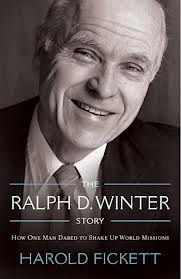Thoughts on Ralph Winter and His Life
 “Of the three faculty members and those who would join them, Winter was the person most involved in new initiatives during his time at SWM. His ideas rarely sparked interest in or involvement from the greater Fuller community. There were just too many of them (ideas)!” (The Ralph Winter Story; location 1322; by Harold Fickett)
“Of the three faculty members and those who would join them, Winter was the person most involved in new initiatives during his time at SWM. His ideas rarely sparked interest in or involvement from the greater Fuller community. There were just too many of them (ideas)!” (The Ralph Winter Story; location 1322; by Harold Fickett)
I still recall when Andy Andrews said, “Read as many biographies as possible.” What he meant, or what I interpreted from that, was how much you learn from history. In reading, The Ralph Winter Story, I am encouraged as a ministry leader with WorldVenture.
Ralph Winter used his creativity to make massive changes to global missions. He didn’t find his calling until late in life (like me!). While I don’t compare myself with someone of his stature, I do find encouragement in reading his life story. He is quoted a lot in the Perspectives course.
In trying to carve new roads to missions, I felt I needed to understand Ralph Winter’s life story.
A quote from his friend, Trotman is now on my Facebook profile:
“Don’t do what others can do or will do if there are things to be done that other can’t do or won’t do.”
Winter’s struggles to establish new thought processes in missionary work wasn’t always welcome. In one situation, his wife, Roberta clashed with a fellow nurse, Ruth, in Guatamala. Ruth insisted that medically trained missionaries, “…should decide what medical work should include.” Winter and Roberta studied the culture and noticed how the tribal people went to Shaman’s for medical and spiritual advice. To this people group it was strange to separate medical advice from spiritual advice, and Winter or Roberta had observed how often they came to the medical clinic to get marriage advice. However, the author states that Ruth was more traditional and fought them. The book asserts Winter found a way around that obstacle.
Winter had so many ideas and this meant that his creativity had him serving in many different kinds of projects at the same time. In fact, the book suggests his parents may have worried about his constant so-called “lack of focus.”
Tony, my husband, worried for a time about this. Since becoming a believer in 2002, I wrote skits for Solid Rock Christian Fellowship, directed dramas from the stage, ran a women’s tea and coffee for four years (randomly inviting people from the directory to my house which oftentimes meant women meeting other women they didn’t know attended SRCF), a prayer ministry, and helping in set up and take downs of SRCF’s third service. I also had author aspirations and wrote two novels during this time. One received a partial manuscript request from an agent and the other wasn’t fully ready before it was submitted by request to a small publisher. All of this was training for where I am now. Winter had a weakness, too.
With so many ideas, he didn’t fully commit to learning the language the mission board asked him to learn. The downside to having so much creativity is spreading yourself too thin. Winter didn’t really have a job. He got his education through the GI Bill, lived at home, got married, served as a missionary, and had odd jobs. Again, I am not finished reading it yet so I have not learned his whole story. Steady employment may have come later.
With a full time day job and working active online ministries, I am always careful not to do so much that the ministries I have worked hard to build fail due to lack of attention. This is why I read books about people from the past so I can learn from their mistakes and find encouragement in their struggles.
Would you consider financially partnering with me as I serve to empower the church to do more than market their programs, but reach their communities, even on a global scale? Click here to learn more.








